Amy Schultz, co-founder of Bolder Money, is a Certified Money Coach, Accredited Financial Counselor, and Certified Financial Therapist Candidate. Bolder Money is a financial coaching platform addressing the emotional side of money to help women build wealth. Amy and her team of money coaches have brought the power of chat-based financial coaching to thousands of women+, helping them earn more money, pay off debt, build savings, and ultimately create better lives.
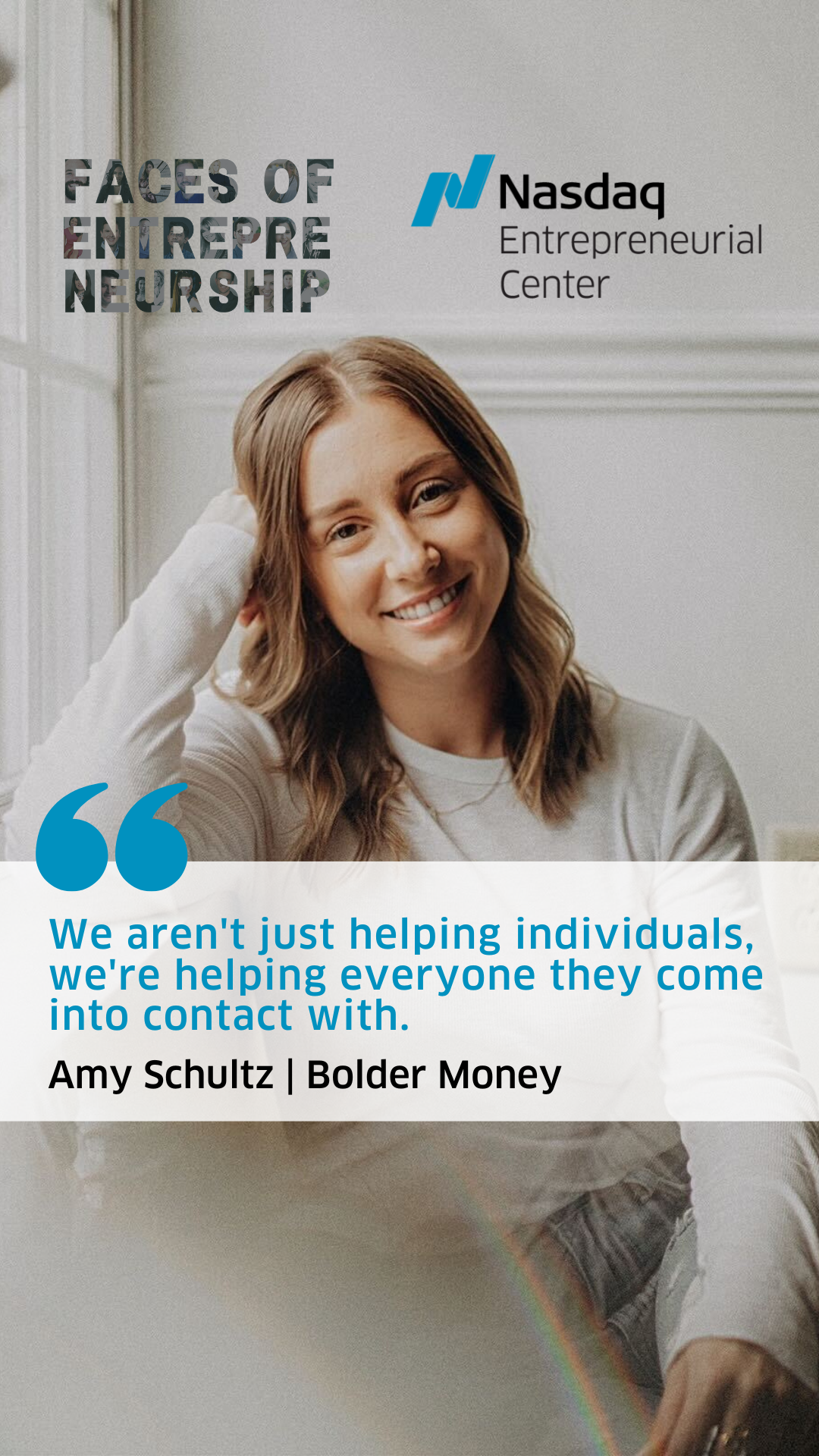 What does “entrepreneurship” mean to you?
What does “entrepreneurship” mean to you?
Amy Schultz: To me, entrepreneurship means seeing problems in the world, and finding a way to solve them. I always wanted to be an activist or a politician, fighting for women’s rights. But when I learned more about business, I realized that entrepreneurship is one of the best ways to make the change you want to see.
Tell us about your first experience with entrepreneurship.
AS: I had my first experience with entrepreneurship in my late 20s. In 2016, I created early designs and a pitch deck for an app that would help parents detect early mental health warning signs in children. Ironically, my own mental health took a turn for the worse a few months later and I let the idea go.
What is your company’s origin story? What is the biggest reason you started your business? What did those early days look like and teach you?
AS: Once you realize you are an entrepreneur at heart, I don’t think you ever look back! A year after my entrepreneurship journey started, the idea for a money coaching business came pretty dramatically. I had a really traumatic childbirth experience with my first son, and desperately wanted more time with him, but was not in a financial position to afford more time off work. I had $80,000 in debt, and no savings other than my 401k. What I did have? A degree in finance, and a whole lot of shame about my situation. I thought: “If I’m struggling this much with money, and I have a strong financial education, there must be others like me who just can’t get out of debt on their own.” I felt deeply unsettled at the way I was stuck because of money and imagined millions of other women feeling the same way, alone, and stressed, with no one to turn to for help. I spent six months researching women and money, how I got into my own financial mess, and what it takes to get out of It. Once I transformed my relationship with money, I began coaching other women to do the same. One of the most important things I learned early on is that solving a problem as big as the gender wealth gap requires a team and scalability. I can’t coach everyone myself! And I shouldn’t – women need help from coaches they can relate to, and that means we need a diverse team that can touch on issues and challenges that I may not have experienced, or recognize. That’s how I transitioned from solo entrepreneurship to co-founding Bolder Money: the only financial coaching platform addressing the emotional side of money to help women build wealth.
What do you wish you knew when you started? Is there anything you would do differently?
AS: I wish I stuck to my gut more when it came to focusing on who and what we want to solve for. In the beginning of any business, it’s easy to get caught up in being able to help as many people as possible, and trying out every new project and partner who wants to work with you. But what I’ve found over the past couple of years is that the more we focus on the group we make the biggest impact on, the more success we see. For us, that’s typically Millennial and Gen X women, non-binary individuals, and couples who are trying to get out of credit card debt or build up savings. They’re at the beginning of their wealth-building journey, and WOW do they have potential that other financial wellness approaches are not unlocking for them. Niching is best for both the business and the customer.
What does “success” look like for you? We’d love to hear your biggest, boldest dream. What do you think will help you achieve it?
AS: Success for me means finding a way to change the sad numbers we hear all the time around women and money. Post-pandemic, it will take some 200 years to close the economic gender gap, which includes statistics like women earn only 82 cents for every dollar a man earns, and women own only 32 cents in assets for every dollar a man owns. My biggest, boldest dream is that Bolder Money plays a critical role in this fight. I want to look back in 5-10 years and say that we can see significant progress in those numbers changing as a result of the work we have done. That means millions of women coached, and billions in net worth growth.
What is your superpower as an entrepreneur? What is your proudest and darkest moment so far? Share a key high and a key low from your journey if you can.
AS: My superpower is vulnerability. I start every talk I give by sharing what I’ve been through, and what it means for all of us. The most common message I hear from women every day Is how hearing my story encouraged them to let go of the shame they had been carrying around money and start taking steps to improve their relationship with it Instead. The financial expert community Is harsh: so much judgment, so many ‘shoulds’, and Bolder’s members come to us because they are looking for a place to just be human, and receive compassionate guidance that addresses the emotions they feel.
My proudest moment: we pitched to a celebrity investor last year, and I led the call with my story. It felt like exactly where I was supposed to be, with exactly what I needed to say. They didn’t invest in us (we knew it was too early going in), but the experience left me feeling confident about the work we’re doing.
My darkest moments have been during this last fundraising season (mid- to late- 2023). They say it is the hardest time for founders to raise money in history and yet I hear so many stories of well-connected, independently wealthy white men raising money easily. I see the Fearless Fund being sued for trying to uplift Black women founders, while I see fund after fund with all white male partners, and all white male CEOs in their portfolios, and tech conferences creating fake women on their speaker lineups because they don’t want to include real women. It’s hard to stomach, and it’s something I’m determined to shift: the answer is (as always) more money in the hands of women. White men manage 93% of VC dollars? That’s not innovation, that’s a silo in which only one type of person can thrive and benefit from the companies built.
What are your personal driving principles, your top values?
AS: Inclusivity, belonging, and authenticity. I am always looking for “Who is being left behind? Who isn’t represented?” And it’s important to me to bring these issues into the light and address them head-on, rather than ignoring them, even if it leads to an uncomfortable conversation. This is a principle I live by. I am great at family functions 🙂
How have your personal principles and values shaped your company’s values and principles? Give us some examples.
AS: We pay attention to the intersectionality of our membership and ask those very same questions about our marketing, our programs and processes, and our team. It’s not enough for us to only help women of one race, or one sexuality, or in one industry, so we need operations that take Inclusivity and belonging seriously.
What’s it like to work alone or with your partners?
AS: My team is amazing! What we are creating is very unique, so we need all hands on deck to experiment, tell us what isn’t working, and share ideas. We share wins from our members all the time to remind us how important our work is, and we talk about the challenges our members are facing that we need to solve (with either current or future features). I am constantly saying to my team of coaches “If you see something that you think can be done better, or you can do better, tell me!”
Do you have a mentor? Tell us about what makes them valuable to you and your business.
AS: I am lucky enough to have a number of wonderful mentors. My co-founder, Sid Singh, was the first to help me transition from operating a solo coaching business to providing a tech-enabled service that could scale. Our investors, Kimmy Paluch and Sergio Paluch from Beta Boom, embody a hands-on investor relationship. Sergio and I have met almost every week since they invested in us in early 2022, to help me work through challenges and uplevel my skillsets as a founder. My own coach, Dora Rankin, continues to help me think like a CEO, and tap into my full power.
What role does mentorship play in your world (as a mentor or mentee)?
AS: I am always a mentor and a mentee! I could go on and on above about the individuals who have helped me on this journey. It’s critical to any business owner’s success. There are times I am stuck in my own head, or forgetting the bigger picture, and sometimes it just takes one sentence from an ‘outsider’ to give me the perspective I need to solve a problem. I also serve as a mentor to our clients, our coaches, and other women business owners. Everything I learn, I can’t wait to share it with someone who it might benefit.
Many entrepreneurs continue to perfect their daily routines to support their work and greater vision; would you mind sharing your morning routine or a regular ritual that grounds your work each day?
AS: My routine is more on a weekly basis than a daily one. The only daily one I absolutely stick to is sleep, then coffee. On a weekly basis, I try to make sure I exercise 2-3 times. I’ll be honest, with a 4- and a 6-year-old, every day is different. Just this week I spent three days home with a sick kid, while navigating partnership calls, investor calls, client calls, building out new features, and coordinating with my team. I’m also neurodivergent, so what works for me one day to increase focus isn’t necessarily the thing that will work the next day. I am definitely not a founder who can get up at 4 am and push through every day the same way to find success, and that’s perfectly okay!
What are you reading or have read?
AS: So. Many. Books. I am reading ten books right now. The ones I am really making progress with are Obviously Awesome by April Dunford and Empathy Economics by Owen Ullman. I also just read The Seven Husbands of Evelyn Hugo by Taylor Jenkins Reid – but be warned, I could not sleep until I finished It!
Where do you go for inspiration?
AS: I talk to our Bolder members. I invite them to calls, run live group sessions, or just send them emails and ask them how they’re doing. Hearing from them keeps me grounded and reminds me what we’re working towards. We accidentally sent an email the other day telling members their subscription was canceled, and when I sent an apology email, so many of them responded “You can’t get rid of me, I love Bolder!!” It was the most inspiration I’ve received in a while. I dug into what those members have experienced and will expand on that In the future to make sure we keep giving them more of what they love. I also love podcasts and try to listen to one How I Built This episode every few weeks.
Do you have a favorite quote, mantra, or words of wisdom to get through the tough days?
AS: “We are the ones we have been waiting for.” – Abby Wambach
I remind myself on tough days: I’m not going to wake up one day and magically be the person I want to be. It’s going to happen slowly, with a million small moments, and one day I’ll look back and realize how far I’ve come. Tough moments are really growth moments, even if they look and feel like a setback.
What is a problem that keeps you up at night?
AS: Violence against the LGBTQ community. Individuals not having access to the healthcare they need. Women who leave the workforce because they can’t afford childcare. School shootings. Lack of quality, affordable mental health support. I worry about authority figures who are so far removed from the people they are making decisions for, and making those decisions based on money rather than empathy and care. And mostly, I am always up figuring out how to get women more money. Because I firmly believe that when women are in power, we make room for everyone else to thrive.
How do you think about helping others through your work?
AS: We aren’t just helping individuals, we’re helping everyone they come into contact with. Women who have money turn around and use it to help others. They start mission-driven businesses. They give back. And most importantly, they show future generations what women having money looks like.
What advice do you have for fellow (and aspiring) entrepreneurs building and leading teams?
AS: Choose to work with people who have experience in the areas you lack, and who are different than you. If everyone on your team looks the same and thinks the same, you will miss the mark on innovation.
What kind of an entrepreneur do you want to be known as – as in, what do you want your legacy to be?
AS: I want to be known as a changemaker, someone who saw big problems in the world and worked to make long-lasting change, that benefits generations to come.
Do you have someone you’d like to nominate to be profiled in our Faces of Entrepreneurship series? Please let us know by emailing media@thecenter.nasdaq.org or submitting your nomination using this form.
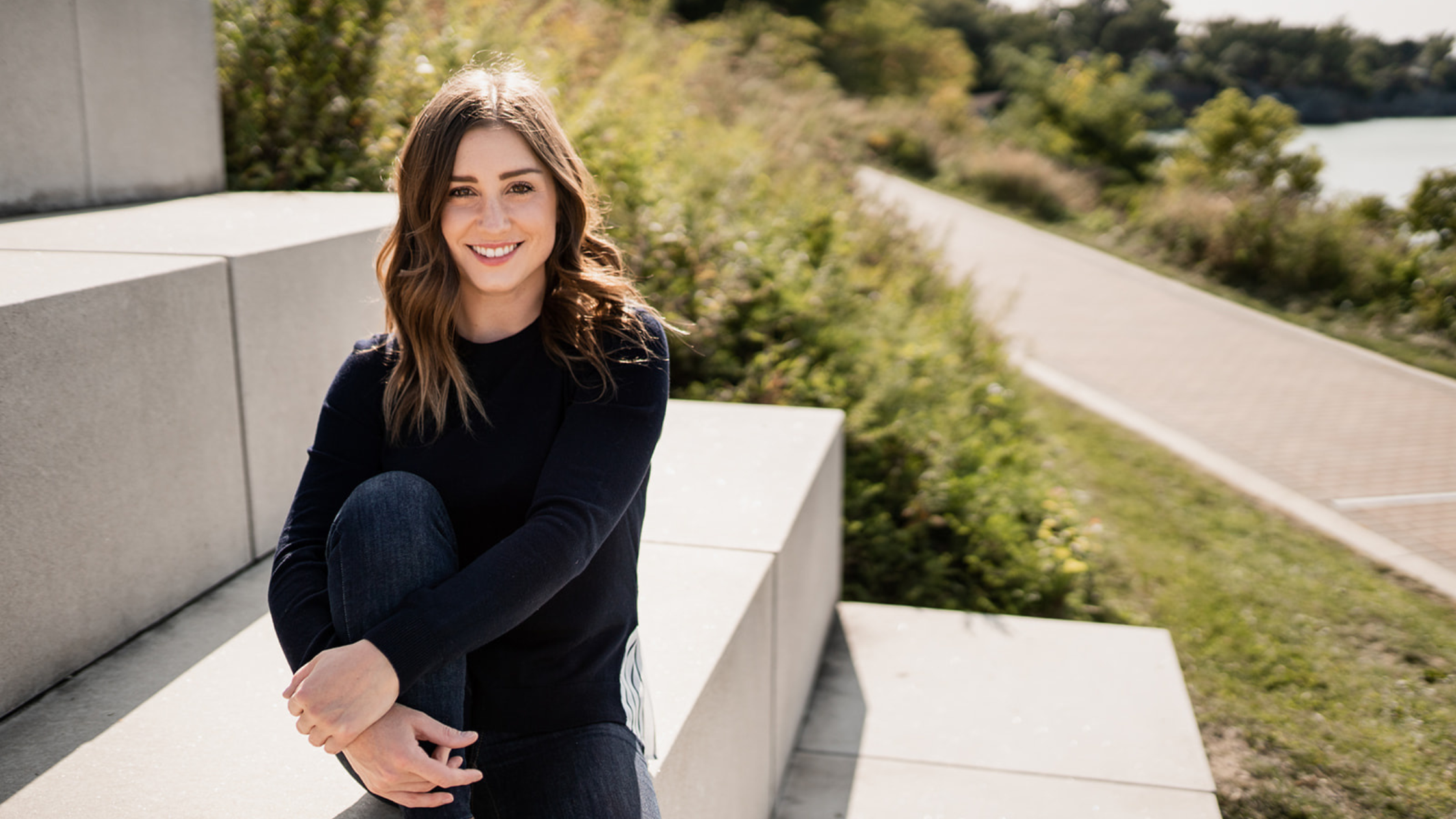
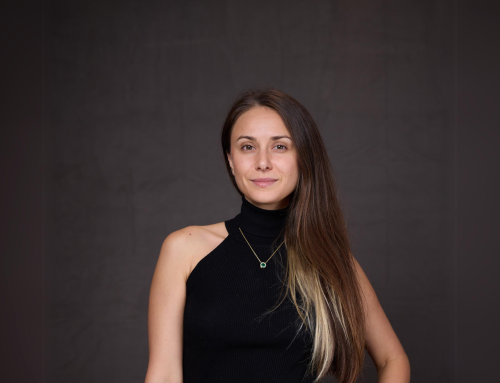
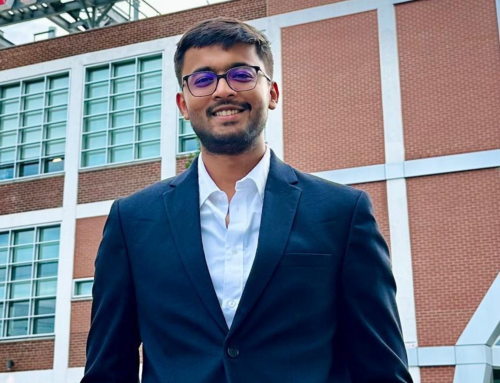
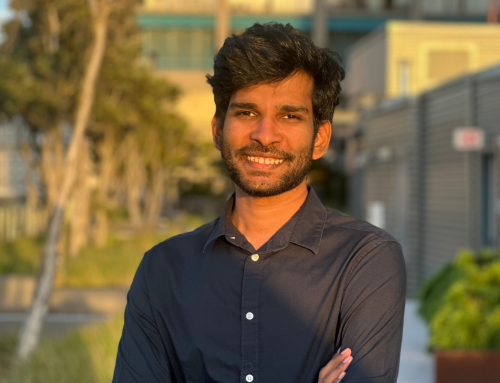
Invite a Friend
Close